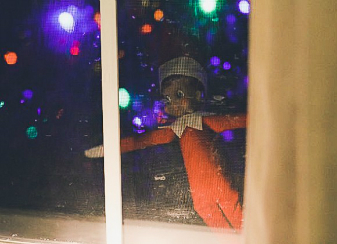A 7-year-old girl called the police to tell on herself after she violated the rules of a popular children’s book.
 Isabelle LaPeruta, of Old Bridge, New Jersey, phoned 911 to say she touched the “Elf on the Shelf” doll, which the story says doing so means Christmas “magic” will leave the child’s home.
Isabelle LaPeruta, of Old Bridge, New Jersey, phoned 911 to say she touched the “Elf on the Shelf” doll, which the story says doing so means Christmas “magic” will leave the child’s home.
“Hello?” the 911 operator said.
“It’s Isabella,” the girl said.
“Hi. Hi, Isabella. Why are you calling 911?” the operator asked.
That’s when the girl panicked.
“Don’t come to my house!” she shouted. “Don’t!”
She said, “I was trying to call my dad” to tell him about accidentally hitting the doll with a ball, causing it to fall.
The operator responded, “You can just say you made a mistake.”
“She was hysterical, crying, she was panicking,” Lynanne LaPeruta tells NBC 4.
Izzy admitted later, “I didn’t want to get in trouble.”
“Isabella apologized. She touched the Elf on a Shelf. She won’t call 911 again,” an officer said after the incident.
“To her, it was an emergency when she touched the elf, and she’s going to ruin Christmas, so that was her emergency,” Old Bridge Police Lt. Joseph Mandola tells the news station. “In her mind, she did right, and it was fine with us.”
The “Elf on the Shelf” has been criticized because of the surveillance aspect of the story — that is, the doll returns to the North Pole each night to report back to Santa on the children’s behavior, EAGnews reported.
Dr. Laura Pinto, an assistant professor at the University of Ontario Institute of Technology, wrote a paper last year a paper titled “Who’s the Boss” on the doll, saying the premise of the story “sets up children for dangerous, uncritical acceptance of power structures,” according to insideHalton.com.
From her paper:
When children enter the play world of The Elf on the Shelf, they accept a series of practices and rules associated with the larger story. This, of course, is not unique to The Elf on the Shelf. Many children’s games, including board games and video games, require children to participate while following a prescribed set of rules.
The difference, however, is that in other games, the child role-plays a character, or the child imagines herself within a play-world of the game, but the role play does not enter the child’s real world as part of the game. As well, in most games, the time of play is delineated (while the game goes on), and the play to which the rules apply typically does not overlap with the child’s real world.
“You’re teaching (kids) a bigger lesson, which is that it’s OK for other people to spy on you and you’re not entitled to privacy,” she tells the Toronto Star.
She calls the elf “an external form of non-familial surveillance,” and says it’s potentially conditioning children to accept the state acting that way, too.
Leave a Comment
COMMENTS POLICY: We have no tolerance for messages of violence, racism, vulgarity, obscenity or other such discourteous behavior. Thank you for contributing to a respectful and useful online dialogue.